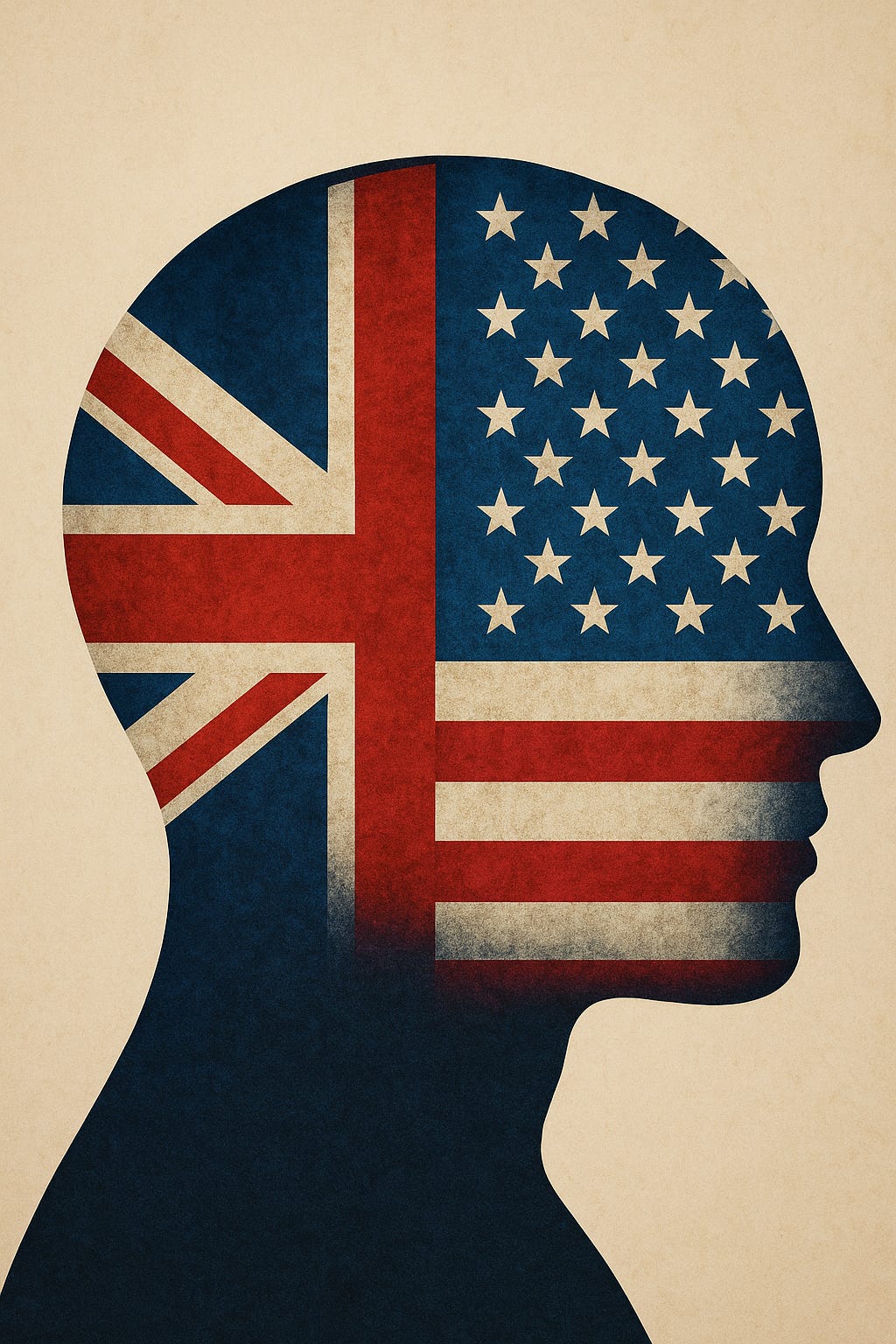CRAZY LIKE THEM
THE AMERICANISATION OF THE BRITISH MIND
‘The golden arches do not represent the most troubling impact on other cultures; rather, it is how the Americans are flattening the landscape of the human psyche itself. They are engaged in the grand project of Americanizing the world’s understanding of the human mind.’ (Ethan Watters.)
INTRODUCTION
A recurring theme in my Substacks so far has been the elasticity of psychiatric/disability concepts and the ways in which our ideas about what constitutes ‘mental illness’ and ‘disability’ have changed over time. In ‘Smartphones Have Not Destroyed a Generation’ I took aim at the Jean Twenge/Jonahan Haidt-inspired alarmism about smartphones/social media-use among young people—“the greatest destruction of human capital in human history”—by positing that the lack of definitive biomarkers for functional mental illness makes it difficult to assess whether the actual true prevalence of mental illness among young people has actually increased or not. In my last blog, ‘Man, the Provider,’ I argued that the elasticity of the concept of ‘disability’ can sometimes serve to mask structural redundancy in deindustrialised areas. Or, as Foucault put it, ‘madness, the absence of work.’ In this blog I want to explore the elasticity of Psychiatric concepts further and make the case that our ideas about what constitutes ‘mental health’ and ‘mental illness’ can be shaped by imported vocabularies of distress.
CRAZY LIKE US
In his 2011 book ‘Crazy Like Us: the Globalisation of the Western Mind,’ Ethan Watters took his readers on a whistle-stop tour of the global landscape of mental illness as influenced by ideas imported from American Psychiatry and psychotherapy. Watters focused on the understanding of eating disorders in 1990s Hong Kong, PTSD in post-tsunami Sri Lanka, psychosis in Zanzibar, and depression in Japan, in order to illustrate his point that American psychiatry and psychotherapy do not simply export treatments but also export categories of illness themselves. He demonstrates that by shaping the very language and framework through which distress is understood, American models tend to overwrite (or at least distort) local cultural conceptions of suffering. In Hong Kong, for example, Western media and diagnostic manuals reframed body-image anxieties into anorexia; in Sri Lanka, American ‘trauma experts’ imposed a PTSD template onto communities with different healing traditions; in Zanzibar, local spiritual understandings of psychosis were displaced by Western biomedical models; and in Japan, pharmaceutical companies promoted depression as a chemical imbalance in need of antidepressants.
For Watters, this demonstrates that globalisation doesn't just spread therapies and treatments, it also spreads the Western mind itself and in so doing transforms how people experience, narrate, and treat their suffering, often with unintended and disruptive consequences. He makes the case that American psychiatry and psychotherapy don’t just travel as neutral treatments; they carry cultural assumptions that reshape local experiences of illness. His argument is that this type of globalisation (Americanisation really) exports diagnostic categories and illness narratives as much as medications or therapies.
VASSAL STATE
In this essay I want to extend his argument further and apply it to my own country, Great Britain. Britain is no longer just a co-producer of psychiatric knowledge but also, increasingly, a consumer of American diagnostic categories, therapeutic fashions, and cultural scripts about mental distress. To be clear, this forms part of a wider process of Americanisation of British culture which has accelerated over the past few decades, and can be seen in a myriad of different ways, from Halloween slowly replacing Bonfire Night in popularity, to English footballers ‘bending the knee’ in response to events which have happened in a specifically American context. Books like ‘This is not America’ by Tomiwa Owolade have addressed encroaching Americanisation from a race relations perspective and books like ‘Vassal State: How American Runs Britain’ by Angus Hanton have addressed this from an economic perspective. But what has not been fully acknowledged is how increasing Americanisation is reshaping the very way we think about suffering, and the language we use to describe our distress. Something I wish to address in this essay.
SYMPTOM POOL
A key component of Watters’ argument is that the experience of mental illness cannot be separated from culture. Distress is not expressed in a vacuum; it draws upon the language, metaphors, and idioms available in a given society. Watters uses the idea of a ‘symptom pool’ (borrowed from Edward Shorter) to explain this. Every culture maintains a pool of legitimate ways to express suffering, a set of symptoms that are recognised as real, intelligible, and worthy of care. When new categories are introduced, the pool shifts. Some forms of distress that were once marginal become mainstream; others are submerged or forgotten. The ‘symptom pool’ then is sort of Overton Window of mental illness.
In ‘‘From Paralysis to Fatigue: A History of Psychosomatic Illness in the Modern Era’ Edward Shorter explains the ‘symptom pool’ thusly:- ‘As doctors’ own ideas about what constitutes “real” disease change from time to time due to theory and practice, the symptoms that patients present will change as well….The surrounding culture provides our unconscious minds with templates, or models, of illness…. All these templates, or different ways of presenting illness, constitute a symptom pool—the culture’s collective memory of how to behave when ill….Until the middle of the 20th century people knew about the contents of this pool from popular culture, an oral tradition that communicated from generation to generation whatever individuals told each other about aches, pains, and other bodily woes. Today the media more than any other conduit tells us about the symptom pool.’
Watters takes the concept of the ‘symptom pool,’ conceived by Shorter as pertaining to psychosomatic illness, and applies it to mental illness more generally. As he puts it: ‘‘symptoms of mental illnesses are the lightning in the zeitgeist, the product of culture and belief in specific times and specific places.’ In the field of cross-cultural psychiatry there is the concept of a ‘culture-bound syndrome,’ a cluster of signs and symptoms that are recognised as an illness within a specific culture, but which may not have the same meaning (or may not exist at all) outside that culture. Ethan Watters' argument is that all mental illnesses are, at least partly, culture-bound syndromes, in the sense of being shaped and expressed through culture. The underlying vulnerabilities (genetic, neurological, biochemical) may be universal, but the way distress takes shape, what symptoms people present with, what counts as illness, and what gets medicalised in the first place, often depends on cultural context.
PATHOGENIC VS PATHOPLASTIC
To illustrate his point, Watters makes a distinction between pathogenic aspects of illness and its pathoplastic aspects. Pathogenic factors pertain to what causes, or is theorised to cause, an illness to occur in the first place. Whereas ‘pathoplastic’ refers to the factors that shape how an illness is expressed. When I refer to the Americanisation of the British mind, this is what I'm referring to. I'm not suggesting that American culture is literally making British people depressed or psychotic, i.e I’m not suggesting that it’s a pathogenic factor. I'm suggesting that it's a pathoplastic factor. The Americanisation of British culture plays a role in shaping the symptom pool (which patients draw upon when they present to medical professionals) and also how they conceive of the symptoms which they are experiencing in the first place.
SMARTPHONES HAVE NOT DESTROYED A GENERATION
This also helps to clarify the ongoing debate about social media and mental illness. Commentators often frame platforms like Instagram, TikTok, or Snapchat as pathogenic, as if they directly cause depression or anxiety in young people in the same way that the Tuberculosis Bacilli causes Tuberculosis. But the evidence for a simple causal link is mixed and inconsistent. A more useful lens is to see social media as a pathoplastic factor. These platforms provide the language, imagery, and scripts through which distress is expressed and understood. They shape the symptom pool by normalising certain idioms of suffering (‘trauma’, ‘OCD,’ ‘ADHD,’ etc,) and by amplifying diagnostic labels as markers of identity or belonging. The result is not that social media manufactures illness from nothing, but that it channels pre-existing vulnerabilities into particular cultural forms. Psychiatric concepts, once intended to describe discrete clinical phenomena, have been rendered into cultural shorthands and transmitted via memetic contagion in this rather loose manner. Diagnostic terminology, like PTSD, OCD, ADHD, or Bipolar, circulate far beyond the clinic. On social media they become quick idioms for everyday frustrations or personality quirks, stripped of clinical nuance. In this way, concepts derived from Psychiatry spill outward, colonising the language of ordinary life.
WE ALL LIVE IN AMERICA NOW
This process is inseparable from the wider Americanisation of our culture. The collapse of newspapers and the rise of algorithmic platforms like X and YouTube is slowly dissolving the shared civic frame that once sustained a British national consciousness/culture. Newspapers were not just carriers of information; they gave populations a common story through which to interpret events. The newspaper was not just a medium of information, but a mechanism through which national consciousness was constructed and sustained. They helped populations imagine themselves as part of a shared civic story, reading the same headlines, reacting to the same events, bound by a common frame of reference. As they decline, especially across the Anglosphere, that shared frame collapses.
What replaces it? Transnational algorithmic feeds, dominated by American cultural and political tropes. The result is a subtle but accelerating transformation. Anglophone societies becoming culturally ersatz Americans with their public discourse shaped less by national experience than by imported partisan scripts. British political discourse is slowly being colonised by American categories, often without reflection on whether they map meaningfully onto our own institutions, history, or civic identity. We're slowly replacing our civic and political imagination with one that isn't ours. The idea that Britain is a 'nation of immigrants' being a classic example of this but far from the only one.
National newspapers were a key node in the development of a national consciousness. Their decline therefore portends changes in national consciousness i.e Anglophones becoming plastic Americans. Platform algorithms (principally owned by Americans) prioritise content Americans are interested in. Infinite-scroll features, autoplay videos, and constant notifications link users into a relentless consumption rhythm. That means British audiences increasingly encounter the same American memes, controversies, and soundbites as Americans do. As national newspapers vanish, rooted civic narratives are replaced by American-style identifiers. These overshadow region-specific terms and memories, which end up flattened into an Americanised framing.
This process of Americanisation runs deeper than politics, and has started to reshape our cultural inheritance (as we start to imagine ourselves as Americans,) something which risks ultimately dissolving our national cultural literacy into a digital soup of a flattened, globalised, American-centric vernacular. Newspapers once provided a shared civic frame but they have now been replaced by hyper-personalised feeds and globalised content with an Americanised slant. Their decline has left us vulnerable to transnational feeds dominated by American cultural and political tropes. What replaces the old civic frame is an algorithmic one which is tuned to American audiences, structured around American controversies, and transmitted in an American vernacular. British users scrolling these platforms increasingly encounter the same memes, moral panics, and diagnostic idioms as Americans. The effect is subtle but profound: our symptom pool, once grounded in local idioms of distress, is now saturated with Americanised shorthands.
THE AMERICANISATION OF THE BRITISH SYMPTOM POOL
In this sense, Psychiatric concepts that are fashionable in America, and which are then rendered into cultural shorthands and transmitted via memetic contagion here, are just one part of a broader pattern. The same dynamic that has Americanised British political discourse has also reshaped how Britons understand their inner lives. Our distress is narrated less in native idioms and more through imported categories, reflecting not only clinical influence but also the algorithmic logic of American platforms.
Whereas British stoicism once located virtue in reserve/restraint, American culture locates it in expression. Over the last twenty-thirty years, Britain has quietly migrated from the former to the latter. The rise of American psychiatric idioms in our symptom pool is not just a medical import; it reflects a deeper cultural reorientation, one that recasts the very meaning of dignity, resilience, and selfhood. Our modern obsession with ‘mental health,’ particularly its expansive, all-encompassing usage, isn't just a well-meaning effort to reduce stigma, its part of a broader cultural shift in how we interpret distress, struggle, identity, and meaning, and like so much else in recent British life, it's been shaped by American imports.
The British have historically valued stoicism, the ability to endure hardship without complaint. It's woven into our cultural archetypes: the stiff upper lip, the Blitz spirit, the dry understatement in the face of tragedy. To be emotionally self-contained was once seen not as repression, but as a kind of moral dignity, a way of keeping your suffering from burdening others, or from becoming the centre of your identity. Whereas the American cultural tradition encourages expressive individualism, the idea that your inner emotional state should be externalised, affirmed, and validated. Pain, trauma, anxiety: all are to be named, shared, and processed publicly.
AMERICAN EXPRESSIVE INDIVIDUALISM VS BRITISH STOICISM/RESTRAINT
American expressive individualism didn’t just appear out of nowhere; it reflects deeper historical and cultural currents. For one thing, it reflects a long history of participatory democracy. From the Revolution onward, American political culture has prized open speech, testimony, and participation. American legal culture, with its strong emphasis on individual rights, has also encouraged citizens to assert themselves. American-style Protestantism, revivalism, and confessional culture all encouraged naming sins, struggles, and conversions openly, weaving emotional disclosure into civic life. American expressive individualism also stems from its greater cultural and linguistic diversity too. Americans smile more, a fact that apparently stems from its history of high immigration/high diversity, which required more of an emphasis on non-verbal communication out of necessity due to the multiplicity of languages spoken. The corollary to that being that in more homogenous cultures (such as Great Britain until relatively recently) there was generally less of an emphasis on non-verbal communication, and subsequently less need for an American-style expressiveness, as a consequence.
Likewise, traditionally British-style stoicism reflects its own cultural inheritance such as hierarchical institutions, class-based codes of restraint, and a cultural premium on understatement and reserve. Britain’s long history of monarchy, aristocracy, and class stratification fostered a culture of deference and self-restraint. To maintain one’s dignity within a rigid hierarchy, restraint and understatement were prioritised. Over-expression could appear immodest, subversive, or lacking in self-control. The British class system produced elaborate codes of conduct, where controlling one’s emotions was a marker of refinement and respectability. The upper classes prized understatement and irony, which trickled down as aspirational norms. Emotional excess was coded as vulgar or un-English/British. Plus, a relatively longstanding/settled homogenous population (compared to America.) meant there was less emphasis on non-verbal communication and expressiveness more generally.
CONCLUSION
Ethan Watters showed us how American psychiatry/psychotherapy exports more than just treatments, it also exports categories of illness and modes of thought. Britain’s symptom pool, once shaped by idioms of stoicism, understatement, and endurance, is increasingly saturated with Americanised concepts which spread as cultural shorthands via memetic contagion. This is not a matter of pathogens but of pathoplastics. American categories do not directly “cause” mental illness, but they profoundly shape how suffering is narrated, legitimised, and medicalised. Digital media has accelerated this shift. Algorithmic feeds tuned to American audiences expose us daily to American controversies, memes, and diagnostic vocabularies. The decline of newspapers, which once sustained a shared national frame, has left us reliant on imported categories to interpret not just politics, but our inner lives. The result is a Britain that increasingly experiences its own suffering through American eyes. Our symptom pool itself has been colonised. What we risk losing is not only older idioms of stoicism and resilience, but also the ability to narrate distress in ways that are distinctively our own.






Very interesting post, but so depressing. Depressing because I see no way of stopping this relentless Americanisation of our culture, of which the Americanisation of the symptom pool is, as you say, just one example. Mass immigration accelerates the process, of course, because new arrivals who are living among other new arrivals and are not rooted in Britain are obviously more receptive to cultural messaging from American media.
I wonder whether this can all be blamed on algorithms and YouTube, though. The George Floyd nonsense was not just something that happened online, it was covered as a major story by the same newspapers you say once helped maintain our shared civic frame and by television news. The BBC did a series of reports on “colonial legacies“ and Britain’s role in slavery (https://youtu.be/ScrCYA8-ORU?si=CafWAHH5scM1DNjI ). The Prime Minister announced that the murder of a foreigner at the hands of a foreign police force had led him to launch an inquiry into race relations in Britain. I don’t believe he would have done this had the issue not been as prominent as it was in the mainstream media.
The issue here is that Britain’s elites are obsessed with American trends and are more Americanised than normal British people, at least as far as politics is concerned. An example that doesn’t seem to have received much comment is the changing position of the Conservative party towards the Israel-Palestine conflict. Mrs Thatcher took an even handed approach and had some sympathy with the Palestinians. Kemi Badenoch believes that the mass slaughter of civilians in Gaza is a “proxy war” Israel is fighting on behalf of Britain. British Conservatives in thrall to America have looked at American conservatives and decided that being conservative must entail unconditional support for the state of Israel. Ordinary British people, however, do not take their cues from American politicians and they have decided that they don’t like what is going on in Gaza.
“A more useful lens is to see social media as a pathoplastic factor. These platforms provide the language, imagery, and scripts through which distress is expressed and understood. They shape the symptom pool by normalising certain idioms of suffering (‘trauma’, ‘OCD,’ ‘ADHD,’ etc,) and by amplifying diagnostic labels as markers of identity or belonging.”
A brilliant, subtle piece. Illuminating